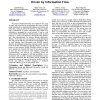Free Online Productivity Tools
i2Speak
i2Symbol
i2OCR
iTex2Img
iWeb2Print
iWeb2Shot
i2Type
iPdf2Split
iPdf2Merge
i2Bopomofo
i2Arabic
i2Style
i2Image
i2PDF
iLatex2Rtf
Sci2ools
120
click to vote
SIGIR
2006
ACM
2006
ACM
Personalized recommendation driven by information flow
We propose that the information access behavior of a group of people can be modeled as an information flow issue, in which people intentionally or unintentionally influence and inspire each other, thus creating an interest in retrieving or getting a specific kind of information or product. Information flow models how information is propagated in a social network. It can be a real social network where interactions between people reside; it can be, moreover, a virtual social network in that people only influence each other unintentionally, for instance, through collaborative filtering. We leverage users’ access patterns to model information flow and generate effective personalized recommendations. First, an early adoption based information flow (EABIF) network describes the influential relationships between people. Second, based on the fact that adoption is typically category specific, we propose a topic-sensitive EABIF (TEABIF) network, in which access patterns are clustered with res...
Related Content
| Added | 14 Jun 2010 |
| Updated | 14 Jun 2010 |
| Type | Conference |
| Year | 2006 |
| Where | SIGIR |
| Authors | Xiaodan Song, Belle L. Tseng, Ching-Yung Lin, Ming-Ting Sun |
Comments (0)

